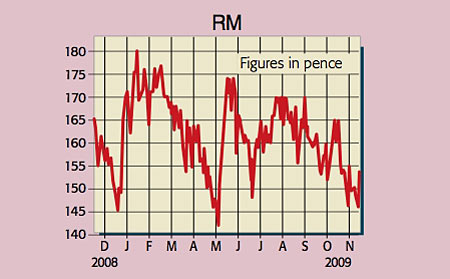Get the latest financial news, insights and expert analysis from our award-winning MoneyWeek team, to help you understand what really matters when it comes to your finances.
You are now subscribed
Your newsletter sign-up was successful
Want to add more newsletters?

Twice daily
MoneyWeek
Get the latest financial news, insights and expert analysis from our award-winning MoneyWeek team, to help you understand what really matters when it comes to your finances.

Four times a week
Look After My Bills
Sign up to our free money-saving newsletter, filled with the latest news and expert advice to help you find the best tips and deals for managing your bills. Start saving today!
In 2004 the British government launched a 15-year plan to upgrade 3,500 schools, with £4.5bn earmarked for information, computing and technology (ICT). That's equivalent to £1,675 per pupil.
Despite delays in rolling-out the programme, one firm set to benefit is RM Group. It has around a 30% share of Britain's ICT education market (worth £1.1bn). It's also won an estimated 34% of all the Building Schools for the Future (BSF) contracts tendered more than twice the number won by its closest competitor, Ramesys.
Indeed,RM recently secured a prestigious £16.5m deal in Hull, together with renewing its agreement to run Scotland's educational intranet service. The group is also moving away from standard hardware sales, towards higher-margin products and services.
MoneyWeek
Subscribe to MoneyWeek today and get your first six magazine issues absolutely FREE

Sign up to Money Morning
Don't miss the latest investment and personal finances news, market analysis, plus money-saving tips with our free twice-daily newsletter
Don't miss the latest investment and personal finances news, market analysis, plus money-saving tips with our free twice-daily newsletter
RM Group (LSE: RM. ), rated a BUY by Investec

The City is forecasting 2009 turnover and underlying earnings per share (EPS) of just £330m and 13.9p respectively, rising to £347m and 15.9p in 2010. So RM trades on miserly price/earnings (p/e) ratios of 10.4 and 9.1, while offering a 4% dividend yield. Its balance sheet is solid with low net debt, and future earnings visibility is good due to a £425m order book. Costs are being tightly managed with 250 employees already based in India to give low-cost IT support.
So what are the risks? The City's biggest worry is what happens to the BSF programme after the 2010 general election. I think that whichever party wins, it is unlikely that education budgets will be slashed. The UK Treasury seems to agree: it has already underwritten £2.4bn of funding for BSF projects that have been hit by the credit crunch.
#Another concern is that RM Group's cash flow could be affected by the heavy working capital requirements of the scheme, given its high seasonal dependence on the busy summer period. There is also a £5.9m pension deficit (net of tax) hanging over the group.
All the same, with a strong position in a nationally important sector, plus opportunities aboard (12% of turnover), this Grade A stock is a buy. As a bonus, RM Group already has a foothold in America the Obama administration has allocated $100bn for education spending through the American Recovery and Reinvestment Act. Preliminary results are due out on 23 November.
Recommendation: BUY at 150p
Paul Hill also writes a weekly share-tipping newsletter, Precision Guided Investments
Get the latest financial news, insights and expert analysis from our award-winning MoneyWeek team, to help you understand what really matters when it comes to your finances.
Paul gained a degree in electrical engineering and went on to qualify as a chartered management accountant. He has extensive corporate finance and investment experience and is a member of the Securities Institute.
Over the past 16 years Paul has held top-level financial management and M&A roles for blue-chip companies such as O2, GKN and Unilever. He is now director of his own capital investment and consultancy firm, PMH Capital Limited.
Paul is an expert at analysing companies in new, fast-growing markets, and is an extremely shrewd stock-picker.
-
 ISA fund and trust picks for every type of investor – which could work for you?
ISA fund and trust picks for every type of investor – which could work for you?Whether you’re an ISA investor seeking reliable returns, looking to add a bit more risk to your portfolio or are new to investing, MoneyWeek asked the experts for funds and investment trusts you could consider in 2026
-
 The most popular fund sectors of 2025 as investor outflows continue
The most popular fund sectors of 2025 as investor outflows continueIt was another difficult year for fund inflows but there are signs that investors are returning to the financial markets